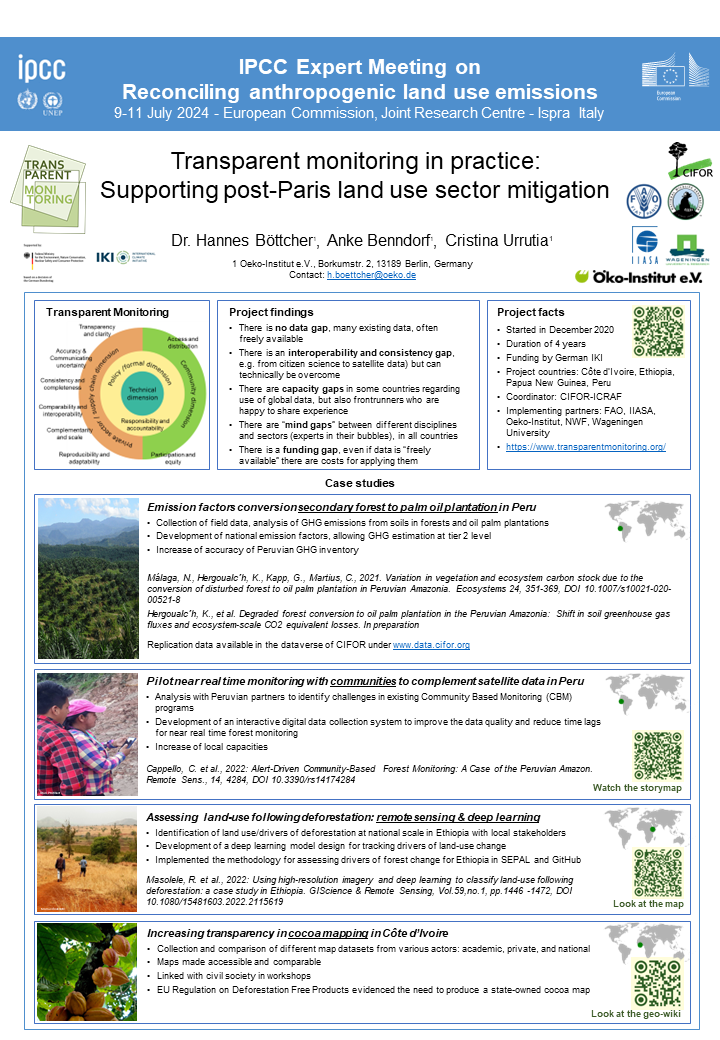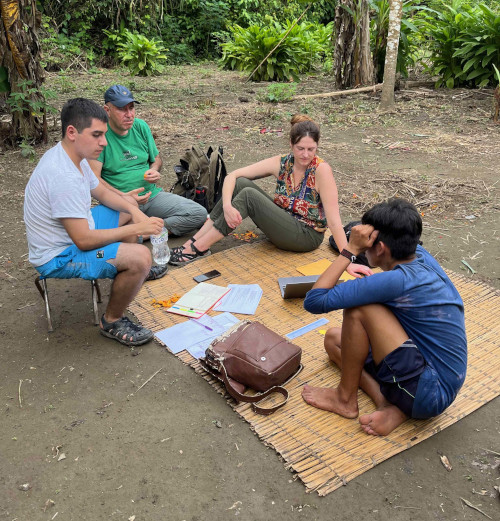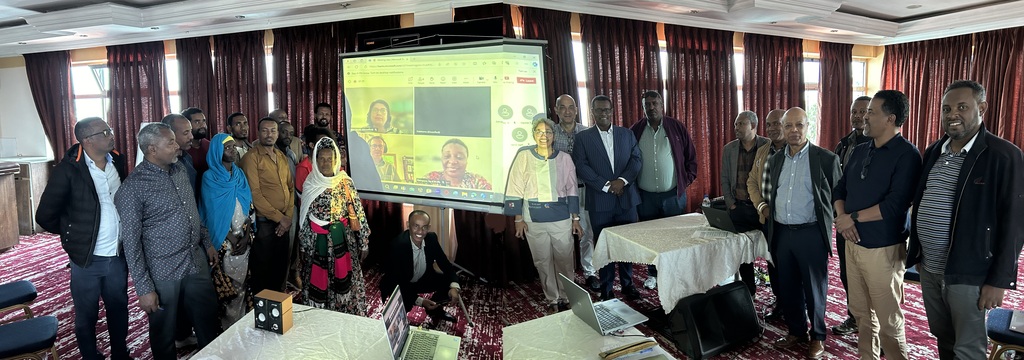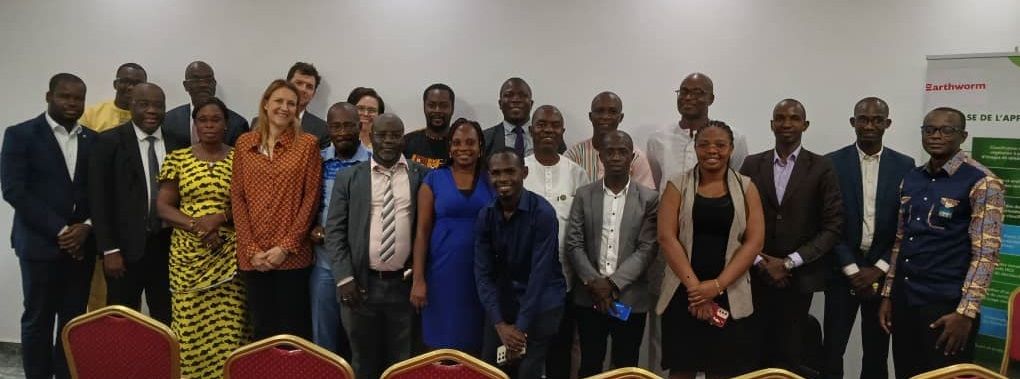Activities
Project presented at GLF forests 2025 - April 25, 2025 in Bonn, Germany
The Transparent Monitoring project results will be presented at GLF forests 2025 on April 25 in Bonn. Hannes Böttcher will talk about "Monitoring matters – transparency makes climate action effective" As a contribution to the Forest talks he will argue that land management has important implications for climate change, making it essential to monitor it transparently. Increased transparency helps to improve decisions, accountability, and responsibility of all actors.
Project represented in side event at COP 29 - Nov. 14, 2024 in Baku, Azerbaijan
The Transparent Monitoring project was represented at a COP 29 side event in Baku. Transparent monitoring is key for accountability & equity in combating climate change, deforestation & land degradation. But how transparent is transparent enough? At a COP29 side event we shared insights from experts & countries on impact of transparent data on policy development, and how local data contribute to increase the ambition of the NDCs. The opening presentation by Hannes Böttcher is available here.
Poster at the IPCC Expert Meeting on Reconciling anthropogenic land use GHG estimates - July 9-11, 2024 in Ispra, Italy

Hannes Böttcher presented the project in a poster at the IPCC Expert Meeting on Reconciling anthropogenic land use GHG estimates that was held at JRC in Ispra, Italy. The meeting brought together experts working in three different communities: experts on GHG inventories, scientists developing land use models, and experts in the field of remote sensing. They discussed differences between their approaches to estimating GHG emissions and removals from land use. A finding from the meeting was that a reconciliation between different approaches is needed, similar to a “translation” between languages. The quality of the translation has impacts on the estimated remaining global carbon budget and the timing to reach net zero GHG emissions. An important discussion focused on ways how to best communicate differences. Our project will provide examples where this communication was successful and more transparency was achieved.
MSU and PUCP Receive Grant to Enhance Forest Conservation with Indigenous Federations

The Forest Carbon and Climate Program (FCCP) at Michigan State University (MSU) and the Pontifical Catholic University of Peru (PUCP) have been awarded a grant from the Tinker Foundation for their project, "Inclusive and Sustainable Conservation Partnerships." This initiative aims to enhance forest conservation with Indigenous communities by focusing on Community Planning, Strengthening the Indigenous Economy, and Advancing Gender Equality.
Using an Action Research framework, MSU and PUCP will collaborate with Indigenous federations and state officials to develop pilot protocols in Peru’s San Martín region. The project will co-create an implementation toolkit with CODEPISAM and FEPIKECHA, test it in three communities, and refine it based on feedback. The final toolkit will be presented to Peru’s Ministry of the Environment and shared broadly.
This new project builds on a three-year study of Peru’s Conditional Direct Transfers (TDCs), a state-led conservation mechanism. The study led to 10 recommendations for improving TDCs, three of which will be implemented in this new project to support gender equality, community priorities, and cultural assets
Read the entire press release.
Ethiopia Synthesis Workshop - June 14, 2024 in Addis Ababa, Ethiopia

25 in-person participants from government organizations, research institutes, and forest-dependent communities, plus 5 online participants from overseas participated in the Synthesis Workshop in Ethiopia, co-organized by CIFOR-ICRAF and the REDD+ Secretariat of the Ethiopian Forestry Development (EFD) at the Ethiopian Ministry of Agriculture. In keeping with the multi-level and participatory research themes of the project, participants came from institutions at the International, Federal, Regional, Zonal, Woreda and Kebele (village) levels.
The "Transparent Monitoring in Practice: Supporting post-Paris land use sector mitigation" project, funded by the German Federal Ministry for the Environment, Nature Conservation, Nuclear Safety and Consumer Protection (BMUV), supports developing nations in enhancing their Monitoring, Reporting, and Verification (MRV) systems. The project operates in Côte d'Ivoire, Papua New Guinea, Peru, and Ethiopia. In Ethiopia, the project integrates open-source tools and TM concepts into the national MRV system, focusing on biomass assessment and community involvement.
The workshop:
- Presented findings from the research in the four case study countries, with a focus on activities in Ethiopia
- Provided updates on the UNFCCC's Enhanced Transparency Framework (ETF)
- Shared lessons from forest data sharing and participatory MRV in other projects
- Discussed participant experiences and collected their feedback and recommendations
Presentations were provided by:
- Hannes Böttcher, Oeko-Institut: Transparent monitoring in practice – overview of a global research project.
- Cristina Urrutia, Oeko-Institut: Enhanced transparency framework – what it means for countries like Ethiopia.
- Arun Pratihast, Wageningen University: PERU: Participatory monitoring tools and integration into REDD+ projects.
- Steffen Fritz, IIASA: COTE D’IVOIRE: Transparency in deforestation from cocoa value chain – implications for coffee in Ethiopia.
- Robert Masolele, Wageningen University: AFRICA: Estimating activity data using publicly-available data sources.
- Ivy Amugune, OFESA: EAST and SOUTHERN AFRICA: Towards a common forest data sharing framework (OFESA project).
- Solomon Zewdie and Stibniati Atmadja, CIFOR: Multilevel MRV – concepts, definitions, actor types.
-
Mengistu Beyessa and Manuel Boissiere, CIFOR-ICRAF:
Participatory MRV – Current local engagement in forest
restoration.
በኢትዮጵያ በቤኒሻንጉል ጉሙዝ ክልል ከሚገኙ የአካባቢው ማህበረሰቦች ጋር የደን መልሶ ማቋቋምን መከታተል።
Côte d'Ivoire Synthesis Workshop - May 15, 2024 in Abidjan, Côte d'Ivoire
Atelier d'échange de connaissances pour les organisations de la société civile sur la transparence dans la filière du cacao et la nouvelle loi européenne sur la déforestation.

En Côte d'Ivoire, la Cocoa and Forest Initiative (CFI) s'appuie sur l'implication du secteur privé dans le suivi et a identifié une opportunité pour le projet Transparent Monitoring de contribuer au suivi, à la traçabilité et à l'agroforesterie. Un besoin spécifique a été identifié pour les définitions de transparence et la vérification indépendante des cartes de référence afin de renforcer les capacités des parties prenantes du pays sur les données utilisées dans les rapports nationaux concernant les gaz à effet de serre. À cet égard, l'objectif du projet de surveillance transparente est d'agir en tant qu’expertise technique et de renforcer les capacités des parties prenantes pour assurer la conception d'un système efficace en ce qui concerne la transparence et la responsabilité, et de développer des orientations pour évaluer l'atténuation des émissions le long des chaînes d'approvisionnement, conformément aux approches nationales. Le projet vise également à améliorer le cadre de transparence pour le suivi des émissions et des absorptions dans le secteur de l'utilisation des terres couvert par la CDN, soutenant ainsi l'ODD 13 (Action pour le climat, par exemple 13.2 Intégrer des mesures de lutte contre le changement climatique dans les politiques, les stratégies et la planification nationales).
La réalisation de l'OMD 13.2 nécessite la mise en œuvre d'un système de suivi, de notification et de vérification (MRV). Dans le cadre de la mise en œuvre du projet Transparent Monitoring dans le secteur du Cocoa, cet atelier vise à renforcer les capacités des organisations de la société civile de Côte d'Ivoire, du Cameroun, dela République du Congo et du Ghana en matière de surveillence transparente et concernant de la nouvelle loi européenne sur la déforestation dans le cadre de la coopération Sud-Sud.
L'objectif de l'atelier est de renforcer les capacités des organisations de la société civile dans les pays. producteurs de cacao, de surveiller la transparence et d'évaluer l'impact de la nouvelle loi européenne sur la déforestation. Une trentaine de représentants d'ONG, du gouvernement et de l'industrie ont répondu à l'invitation à cet atelier.
Des présentations ont été faites par:
- Valérie Reboud & Carlos Riano, EFI: L'EUDR et implications en termes de besoins en données & Des systèmes de traçabilité et de suivi transparent du cacao en Côte d'Ivoire et au Ghana
- Fernand Ballé, CIGN: La carte d'occupation des sols de la Côte d'Ivoire pour 2020
- Astrid Verhegghen, JRC: La carte forestière mondiale du CCR et comparaison avec la carte nationale de la Côte d'Ivoire
- M. Gerome Topka, Earthworm: Partage de l'expérience des ONG en matière de cartographie/rôle prévu en ce qui concerne la diligence raisonnable de l'EUDR sur la déforestation zéro
- Abraham Bio, MINEDD: Le plan de la Côte d'Ivoire en matière de système national de surveillance des forêts et de système d'alerte à la déforestation
Articles presse
Peru Synthesis Workshop - May 7, 2024 in Lima, Peru

20 in-person participants from government organizations, research institutes, and civil society participated in the Synthesis Workshop in Peru. The workshop was co-organized by CIFOR-ICRAF and the Öko-Institut in coordination with the Peruvian Ministry of Environment. The workshop served to present the results of case study work undertaken in Peru and collect feedback from participants on the developed recommendations. This work was undertaken as part of the project "Transparent Monitoring in Practice: Supporting post-Paris land use sector mitigation", funded by the German Federal Ministry for the Environment, Nature Conservation, Nuclear Safety and Consumer Protection (BMUV).
In Peru three case studies were carried out:
- Alert-driven community-based forest monitoring in Peru
- Enhancing Success and Inclusion in community-based monitoring in Peru (Peru’s programm of conditional cash transfer mechanism to communities)
- Improving GHG emission estimates from conversion of secondary forest to palm oil plantations in Peru
Following the presentation of results and an input from the Ministry of Environment on Peru’s progress with regards to the Enhanced Transparency Framework of the Paris Agreement, an interactive panel discussion took place. You can find the agenda here and the presentations below, and read more about the workshop on the CIFOR blog. All materials are in Spanish.
- Berioska Quispe, MINAM: Progress in Peru regarding the Enhanced Transparency Framework of the Paris Agreement
- Cristina Urrutia, Oeko-Institut: Lessons for transparent monitoring, experiences from the Peruvian Amazon
- Arun Pratihast, Wageningen University: Alert-driven Community-based Forest monitoring: A case of the Peruvian Amazon
- Rowenn Kalmann and Lauren Cooper, Michigan State University: Inclusion and transparency as the key to success for the conditional cash transfer mechanism
- Kristell Hergoulac’h, CIFOR-ICRAF: Improving GHG emission estimates from conversion of secondary forest to palm oil plantations in Peru
Scientific Workshop - June 5, 2023 in Bonn, Germany

An unprecedent amount of data is currently generated and made available for assessing land use dynamics. The increasing amount of data has also led to the development of several tools for data analysis for specific purposes. This large amount of information causes confusion, competing definitions and misinterpretation. Users rely on access to a diversity of inter-operable approaches, datasets, and initiatives. Such approaches, referred to as transparent monitoring approaches, can help to detect, anticipate, and resolve potential conflicts or discrepancies between datasets.
At our international scientific workshop, we aimed to shed light on ongoing developments and trends, that are likely to shape transparent monitoring approaches in the future. The following exciting speakers joined the workshop to discuss their views on the topic:
- Hannes Böttcher, Oeko-Institut: Introduction
- Frank Martin Seifert, ESA: The future of earth observation
- Gopika Suresh, Unique: Role of SAR in transparent MRV
- Giacomo Grassi, JRC: Harmonizing land-use fluxes from global models and national inventories
- Neha Hunka, University of Maryland: Harmonizing global forest maps for reporting
- Robert Masolele, Wageningen University: Scaling up a machine learning for assessing land use change
- Douglas Bwire, CIFOR: Community led drone monitoring
- Asger Strange Olesen, moja global: UNFCCC consistent public and private Land Sector
Results of the workshop will be summarised in a paper that will present key developments in the field of land monitoring and presenting key messages for practitioners of transparent monitoring from science, policy, industry, and civil society.
Working session with the Steering Committee - May 31, 2022, online
At the Working session the project reported on progress in the case studies, on completed and ongoing activities, and on planned next steps. Steering Committee members were asked to comment on the achievements, progress and expected outputs. They expressed their contentment with progress in case studies but also urged the project team to ensure complementarity of efforts in case studies, to draw general and transferrable lessons and to strengthen linkages to country efforts related to the UNFCCC and other international processes.
The presentation of the project team at the Working session with the Steering Committee is available for download (4.8 MB).
National scoping workshop - November 23, 2021 Towards the Enhanced Transparency Framework for REDD+ MRV in Peru
As part of the Enhanced Transparency Framework (ETF) of the Paris Agreement, countries are expected to present their GHG inventories once every two years and to report information to track progress in implementation and achievement of their NDCs as part of the Enhanced Transparency Framework (ETF). The ETF aims to improve transparency of climate action for all countries. Monitoring and assessing the impacts of REDD+ will therefore be essential for fulfilling the requirements of the ETF and the Paris Agreement.
The workshop discussed how to improve the transparency and completeness of information needed to monitor and assess REDD+ actions, and launched the Transparent Monitoring project in Peru. More information you can find here.
Project launch event - November 5, 2021 at the Global Landscapes Forum Launchpad, hybrid
Together with representatives of the project team and the project donor BMU we will officially launch our project and reach out to relevant stakeholders. In a series of short interventions followed by a panel discussion we aim to strengthen our understanding about the contribution of a transparent monitoring approach to climate change mitigation in the land use sector and discuss synergies and interactions with other processes and projects in the field of transparency.
Key questions we are aiming at are:
- What are the advantages of a Transparent Monitoring approach and how can their application contribute to strengthening climate action in the land use sector?
- How can a Transparent Monitoring approach help countries fulfil their obligations under the Paris Agreement?
- What will the project deliver and how does it interact with other ongoing work on transparency?
Inception workshop - September 16, 2021, online
The Inception Workshop aimed to present the project to relevant stakeholders. The workshop will support the development of a shared understanding of Transparent Monitoring (TM) and of approaches to evaluate transparency. The project will develop a guidance for TM structured around different entry points (dimensions) to increase usefulnes to different stakeholders. A key role of the workshop was to test the guidance concept.
Participants to the Inception Workshop included the project team, country stakeholders and representatives of partner projects. In a three-hour online meeting the project background and objectives were presented. In two subsequent sessions, the participants discussed the definition of Transparent Monitoring. As a result of the first session, the following definition will guide future work:
Transparent Monitoring is an approach for openness in climate change mitigation in the land use sector that
- improves processes related to data generation, reporting and sharing,
- assesses and resolves uncertainties and potential discrepancies between data sets,
- supports actors in accessing, planning, implementing, and evaluating climate action
In a second session, the project team presented the TM guidance concept. In parallel group discussions the concpet was assessed from the viewpoint of different stakeholders (a technical dimension and a community monitoring dimension). Important aspects for these dimensions were collected and discussed.
The Presentation of the project team at the Inception Workshop is available for download (6.8 MB).